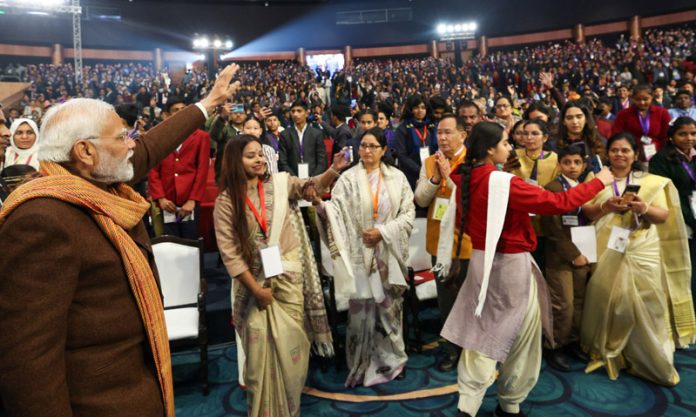
JK, Ladakh LGs, students of UTs join prog online
*Spend time in sunlight, get regular, complete sleep
Sanjeev Pargal
JAMMU, Jan 29: Prime Minister Narendra Modi today interacted with students, parents and teachers during annual ‘Pariksha Pe Charcha’ programme in which a student from Kargil district in the Union Territory of Ladakh also got an opportunity to ask a question. The PM cautioned parents against treating their children’s report cards as their own visiting card.
Lieutenant Governor Manoj Sinha joined the programme virtually from Raj Bhavan here along with students of Government Girls Higher Secondary School Shastri Nagar, SRML Higher Secondary School Parade Ground and Government Girls Higher Secondary School Mubarak Mandi.
Office of LG J&K tweeted the photographs of Manoj Sinha and students watching seventh edition of ‘Pariksha Pe Charcha’ online.
Lieutenant Governor of Ladakh Brig (Retd) BD Mishra along with students of Ladakh also joined the annual programme of the Prime Minister online along with students from the Union Territory.
Najma Khatoon, a student of PM SHRI Kendriya Vidyalaya in Kargil district of Ladakh raised the issue of striking a balance between exam preparations and maintaining a healthy lifestyle. She asked the Prime Minister about managing studies along with exercise.
In response, the Prime Minister mentioned the need to recharge mobile phone to illustrate the need to take care of physical health and asked for maintaining a balanced lifestyle and avoiding excess of everything.
“Healthy body is critical for a healthy mind”, Modi said in response to the question and added that being healthy requires some routines and asked about spending time in sunlight and getting regular and complete sleep. He pointed out that habits like screen time are eating into the required sleep which is considered very important by modern health science.
Modi said that in his personal life too he has maintained a system of going into deep sleep within 30 seconds of going to bed.
“Awake fully when awake and sound sleep while asleep, is a balance that can be achieved”, he said.
Speaking about nutrition, the Prime Minister stressed the balanced diet. He also emphasized the importance of regular exercise and physical activities for fitness.
Besides Najma Khatoon, almost similar question was posed to the Prime Minister by Dhiraj Subhas, a student of Senior Secondary School from Rajasthan and Abhishek Kumar Tiwari, and a teacher from Tobi Lahme a Government Higher Secondary School in Arunachal Pradesh.
Modi cautioned parents against treating their children’s report cards as their own visiting card and asserted that it is crucial to instill resilience in children to help them cope with pressures and parents and teachers should collectively address challenges faced by them.
He suggested that students should compete with themselves and not others and parents should never sow the seeds of competition and rivalry between siblings.
“It is crucial to instill resilience in our children and help them cope with pressures… We cannot just switch off and the pressure is gone. One must become capable of bearing any kind of pressure. They should believe that pressure keeps on building and one has to prepare oneself,” he said during the two-hour interaction.
PTI adds: Prime Minister Narendra Modi suggested students to “always make friends who are more intelligent and work harder”. “You must be inspired by such friends. Don’t let the pressure of studies and examinations overpower you,” he said.
Modi said that even though competition and challenges act as inspirations, competition must be healthy.
“A lot of parents keep on giving examples of other children to their children. Parents should avoid doing these things… Never sow the seeds of rivalry and competition among students,” he said.
“Whenever they meet someone, they will tell them the story of their children,” he said at the seventh episode of his outreach programme with students ahead of examinations.
The Prime Minister explained that the stress faced by students is of three types – induced by peer pressure, by parents and self-induced.
“At times, children take pressure on themselves that they are not performing up to the mark. I suggest that you should set small goals during preparation and gradually improve your performance, this way you will be completely ready before exams,” he said.
“We have to make ourselves capable of facing any sort of pressure. Students need to make themselves ready to go through any condition. If we visit any cold place, we make up our minds, and accordingly, we keep ourselves ready… (in the) same way you have to be ready for exams,” Modi said.
The Prime Minister said that the challenges faced by students must be addressed collectively by parents and teachers. He also encouraged teachers to forge strong connections with their students.
“The bond between educators and learners is the foundation for a bright future. If teachers start working on building a relationship with their students from the first day of the year, there won’t be any question of tension building up among students at the time of examinations,” he said.
“Teachers must expand their connections with students much beyond their subject syllabus so that students can reach out to their teachers even for the smallest of problems. Music teachers can not only help their own students deal with tensions, they can do so for students of the entire school,” Modi said.

